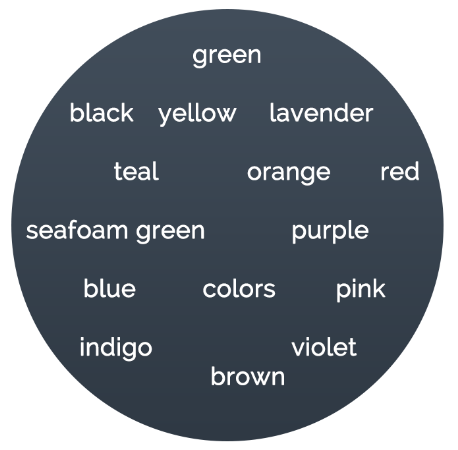 Love. War. Suffering. The circle of life. Good versus Evil.
Love. War. Suffering. The circle of life. Good versus Evil.
What do you think of when you hear these words? If you imagine something large and dramatic, that's a good thing! Story-telling tackles these big ideas in creative ways.
The driving forces that help communicate the author's ideas to us are called messages and themes. They help us understand the bigger picture of a story. They help us connect to a story on an emotional and critical level. In short, messages and themes are a big reason why humans really love stories.
Let's Think Of This As Parts Of A Whole

Look at the circle above.
Does everything inside of the circle belong in the same group?
"Colors" is the category for this group, not a part of the group. Everything else inside in the circle, however, is part of the group. They are examples of colors!
That's how we should look at the difference between theme and message.
Let's Look At Theme First
 Photo by Greg Rakozy on Unsplash
Photo by Greg Rakozy on UnsplashWhat is a theme in a story?
Simply put, a theme is a big idea in a story. It's a big idea because it is universal, meaning it applies to everyone, and it's abstract. Something that's abstract means that it can't be held or touch. For example, something huge like "love" is universal. Love can take many forms, but the idea of love is a concept. Everyone in the world at some point can relate to the idea of love.
To recap: if it's big, abstract, and universal, we've got a theme.
Now Let's Look At Message
 Photo by michael schaffler on Unsplash
Photo by michael schaffler on UnsplashWhat is a message in a story?
A message is an example of a big idea, or the theme, of a story. Recall the above example: love can take many forms. The form that love takes in a story is the message.
Messages are specific to the story, related only to the characters, and are concrete. If you're reading a story about two teenagers falling in love, we can relate to the idea of love but we can't relate to the specific love one character feels for another. Why? We're not them!
Quiz
To recap: Which is a better definition for message?
Subscribe for more quick bites of learning delivered to your inbox.
Unsubscribe anytime. No spam. 🙂
Same Theme - Two Messages!
 Photo by Melissa Askew on Unsplash
Photo by Melissa Askew on UnsplashLet's look at an example
This Side of Paradise by F. Scott Fitzgerald
Young man conformed to society
Finds conformity meaningless
Growing up years after the World War
Is comforted by knowing himself and hopes for a generation not so lost as his
The Catcher in the Rye by J.D. Salinger
Young man isolated by society
Isolation leads to loneliness and cynicism
Growing up years after the World War
Marches to the beat of his own drum, feeling like he is the only sane person left of his generation
Both stories are about young men in a lost generation after a major world war. Both of these men are finding their place in society and figuring out their identity.
We can say that the big ideas in these stories are about finding oneself and growing up as an adult. Those big, abstract, and universal concepts are the themes of the stories. But the characters and their stories are very different. What they go through are concrete, specific situations that help communicate the themes. Those situations are messages.
Quiz
Which of the following isn't an example of a theme?
Take Action
Theme
a big idea or group of ideas
an abstract concept that only exists as an idea
a universal idea or group of ideas that everyone in the world can relate to
Message
a specific example of the theme of the story
related to the characters and actions of the story
concrete forms of an idea
Stories without messages won't have a purpose or an idea to deliver. Stories without themes won't be able to connect to our real-world or communicate larger issues to us.
Think about some stories that you absolutely love. What are your favorite messages and themes?
Your feedback matters to us.
This Byte helped me better understand the topic.

